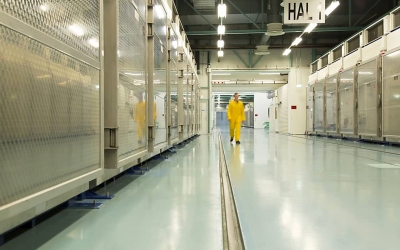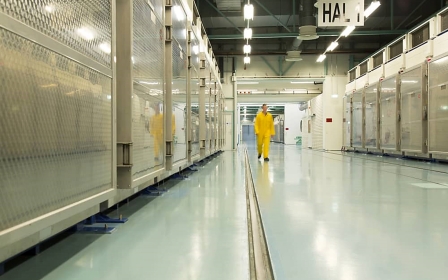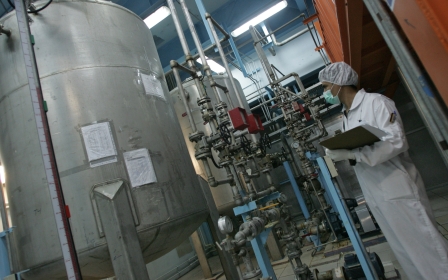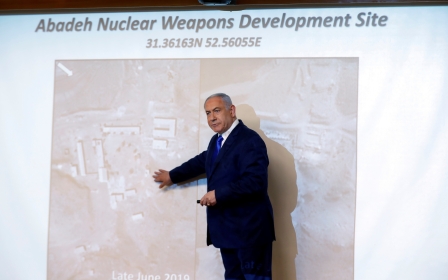Iran says atomic inspector 'sneaked out to WC' to hide explosive traces
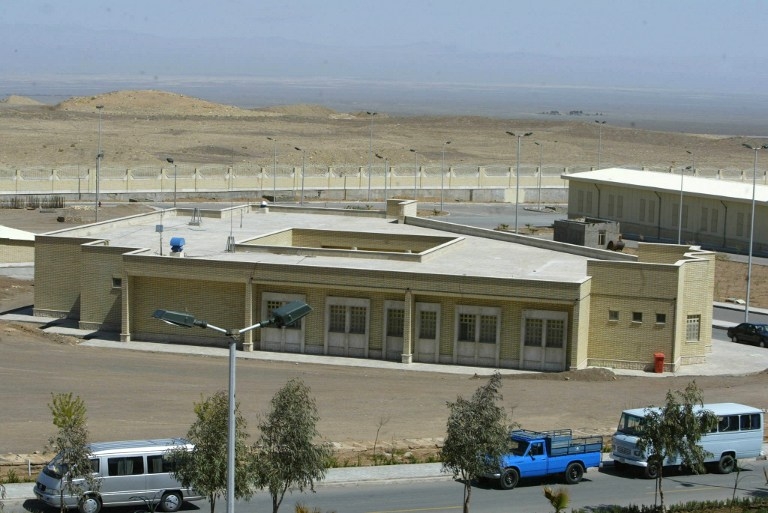
Iran has said it stopped an International Atomic Energy Agency (IAEA) inspector from gaining access to its main uranium-enrichment facility at Natanz because she allegedly tested positive for traces of explosives - as the agency rejected Iran's holding of the inspector.
Tehran's envoy to the UN nuclear watchdog told reporters that, after going to the toilet while waiting for a further search, the inspector no longer showed positive traces, which prompted a further investigation.
Iran also circulated a memo to member states of the IAEA describing in detail the incident that it said began around 11am on 28 October, including that the inspector "sneaked out to go to the WC" and that "alarming signals" were found on a toilet bowl and parts of exit piping, which were dismantled for checks.
The inspector was allowed to leave Iran on 30 October, the memo obtained by Reuters said.
"The agency does not agree with Iran's characterisation of the situation involving the inspector," an IAEA spokesman said in a statement.
"Preventing an inspector from leaving a country... is not acceptable and should not occur."
'Outrageous provocation'
Jackie Wolcott, the US envoy to the IAEA, said on Thursday that detaining the inspector and preventing her from leaving the country was an "outrageous provocation".
In a statement to an emergency meeting of the IAEA's 35-nation Board of Governors, Wolcott said: "All Board members need to make clear now and going forward that such actions are completely unacceptable, will not be tolerated, and must have consequences."
Reuters first reported on Wednesday that Iran had held the IAEA inspector and seized her travel documents in what appears to be the first incident of its kind since Iran's nuclear deal with major powers was struck in 2015.
Iran confirmed on Wednesday that it prevented the inspector from gaining access to Natanz.
The European Union said it was "deeply concerned" by what happened.
"We understand that the incident was resolved and call upon Iran to ensure that no such incidents occur in the future," an EU statement said.
'Suspicious materials'
Kazem Gharibabadi, Iran's ambassador to the IAEA, said Tehran had asked that the inspector be removed from the list of designated inspectors, adding: "There is no doubt that there were suspicious materials involved in this incident."
Acting IAEA chief Cornel Feruta, who will be succeeded by Argentina's Rafael Grossi next month, called Thursday's board meeting to discuss the incident and Iran's failure to give a convincing explanation for uranium traces found at a site in Tehran.
Feruta told Iran in September that "time is of the essence" in addressing the IAEA's questions on how it found the traces on samples taken in February at the undeclared site, which Iran has said was a carpet-cleaning facility.
The EU and the US called on Iran to cooperate with the IAEA in explaining the traces of uranium that was processed but not enriched.
A US official said there were also signs of "activities consistent with sanitisation" by Iran there.
"Time was of the essence in September; now that time is up," Wolcott, the US envoy, said in her statement.
Middle East Eye propose une couverture et une analyse indépendantes et incomparables du Moyen-Orient, de l’Afrique du Nord et d’autres régions du monde. Pour en savoir plus sur la reprise de ce contenu et les frais qui s’appliquent, veuillez remplir ce formulaire [en anglais]. Pour en savoir plus sur MEE, cliquez ici [en anglais].


